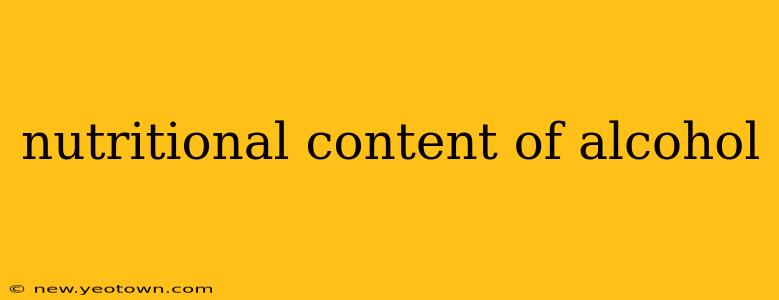Let's be honest, we don't typically reach for a glass of wine or a beer thinking about nutritional value. Alcohol is often associated with social gatherings, relaxation, and, let's face it, sometimes excess. But does alcohol contain any nutrients? The answer is surprisingly nuanced. While not a nutritional powerhouse, alcohol does contribute to our daily caloric intake and, depending on the type, can offer trace amounts of certain vitamins and minerals. Let's dive deeper into the nutritional complexities of this often-overlooked aspect of alcoholic beverages.
What are the calories in alcohol?
This is a frequently asked question, and the answer isn't a simple number. The caloric content varies significantly depending on the type and amount of alcohol consumed. Generally, pure alcohol provides 7 calories per gram. However, many alcoholic beverages also contain carbohydrates (from sugars or grains), which add to the overall calorie count. For example, a standard 12-ounce beer might contain around 150 calories, while a 5-ounce glass of wine can range from 100-150 calories, and a shot of hard liquor (1.5 ounces) typically contains around 100 calories. The added sugars and other ingredients in mixed drinks, naturally, significantly increase the caloric content.
Does alcohol contain any vitamins or minerals?
While not a significant source, some alcoholic beverages do offer trace amounts of certain nutrients. For instance, beer, particularly darker varieties, can contain small amounts of B vitamins (like thiamine, riboflavin, and niacin) due to the fermentation process. Wine, especially red wine, may contain antioxidants like resveratrol, which some studies link to potential health benefits. However, it's crucial to emphasize that these amounts are minimal and should not be relied upon as a primary source of these nutrients.
Is alcohol a healthy source of calories?
Absolutely not. While alcohol does contain calories, these are considered "empty calories" because they lack essential vitamins, minerals, and fiber. Consuming excessive calories from alcohol contributes to weight gain, and regularly replacing nutrient-rich foods with alcoholic beverages can lead to nutritional deficiencies.
Does alcohol have any impact on my body's nutrient absorption?
Yes, alcohol can interfere with the absorption of essential nutrients. Excessive alcohol consumption can damage the lining of the intestines, hindering the absorption of various vitamins and minerals. Chronic alcohol abuse is associated with numerous nutritional deficiencies, including deficiencies in vitamins A, D, E, K, B vitamins, and various minerals.
What about the health benefits often associated with moderate alcohol consumption?
Some studies have suggested a potential link between moderate alcohol consumption and a reduced risk of certain health conditions, like heart disease. However, these studies are often observational and don't necessarily prove causation. Furthermore, the potential benefits are significantly outweighed by the risks associated with excessive alcohol use, which include liver damage, pancreatitis, certain types of cancer, and addiction. Always consult with a healthcare professional before making any significant changes to your diet or lifestyle, including alcohol consumption.
In Conclusion:
Alcohol's nutritional content is minimal and should not be considered a significant source of vitamins, minerals, or healthy calories. While some alcoholic beverages contain trace amounts of certain nutrients, the potential risks associated with excessive alcohol consumption far outweigh any possible benefits. Moderation is key, and always prioritize a balanced diet rich in essential nutrients for optimal health. Remember, the focus should always be on a healthy and balanced lifestyle, not relying on alcoholic beverages for any nutritional value.

